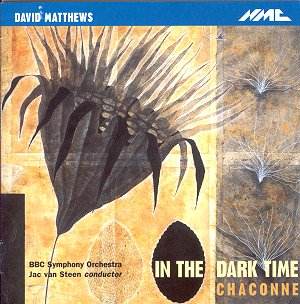 Composer: DAVID MATTHEWS (born 1943)
Composer: DAVID MATTHEWS (born 1943)
Works: In the Dark Time, Op.38 (1984/5); Chaconne, Op.43 (1986/7)
Performers: BBC Symphony Orchestra, conducted by Jac van Steen
Recording: BBC Studio 1, Maida Vale, London, May 1998
Label: NMC D 067
Duration: 47:28
David Matthews’ music, while relatively familiar within certain circles, remains an underappreciated gem in the contemporary classical landscape. This release presents two substantial orchestral works that showcase both his compositional prowess and the poetic depth that characterizes his oeuvre. The juxtaposition of In the Dark Time, a tone-poem rich in atmospheric nuance, and Chaconne, a more formally structured exploration, provides a compelling snapshot of Matthews’ artistic range during the 1980s.
In the Dark Time, composed between 1984 and 1985, serves as an evocative sequel to Matthews’ earlier work, September Music (1979). Both pieces are unified by a shared harmonic foundation, yet each expresses distinct emotional and thematic landscapes. The work is cast in eight contrasting sections, each unfolding with a fluidity that belies its structural rigor. The opening section, marked by a haunting string motif, introduces an introspective quality that permeates the entire work. Here, the BBC Symphony Orchestra, under Jac van Steen’s meticulous direction, captures the somber elegance of Matthews’ writing. The strings, particularly the first violins, deliver their lines with a poignant delicacy that invites the listener into the composer’s contemplative world.
The engineering of this recording is commendable; the clarity of the orchestral textures allows for a discernible interplay of timbres. The brass, for instance, emerge with a brilliant clarity during the climactic moments, while the woodwinds weave a tapestry of color that complements the strings’ emotional core. The interplay between these sections is expertly balanced, ensuring that the listener is drawn into the unfolding narrative without being overwhelmed by any single element.
In contrast, the Chaconne, composed in 1986/7, presents a more formalized exploration of the chaconne structure. Matthews’ decision to emphasize the form over the pictorial is a testament to his commitment to abstraction in music. The title, while seemingly nondescript, reflects the composer’s intent to foreground the intricate development of the two chaconnes that comprise the work. Here, the rhythmic vitality and harmonic progressions create a dynamic tension that is both engaging and intellectually stimulating. The second chaconne, in particular, showcases Matthews’ ability to weave complex counterpoint into a coherent musical tapestry.
Jac van Steen’s interpretation of the Chaconne is particularly noteworthy for its energetic drive and clarity of articulation. Each iteration of the chaconne theme is delivered with precision, allowing the listener to appreciate the craftsmanship inherent in Matthews’ writing. The dynamic contrasts are pronounced, with the quieter interludes providing a necessary respite from the more vigorous passages, thus enhancing the overall dramatic arc of the piece.
In terms of historical significance, both works reflect Matthews’ place within the contemporary classical tradition, where he successfully marries traditional forms to modern sensibilities. His music, while rooted in the English landscape, transcends mere pictorial representation, offering instead a universal exploration of themes related to time, memory, and the human condition. The emphasis on accessibility without sacrificing complexity positions Matthews as a vital voice in the modern canon, deserving of wider recognition.
In conclusion, this recording serves not only as an introduction to Matthews’ artistry but also as a reminder of the richness found in contemporary orchestral music. The performance by the BBC Symphony Orchestra is both polished and passionate, effectively capturing the essence of Matthews’ vision. The recording quality is exemplary, enhancing the listener’s experience of these compelling works. Given the relatively short duration of this release, one hopes that future recordings will delve deeper into Matthews’ extensive catalogue, particularly his large-scale choral-orchestral work, Vespers Op.66, which remains a significant omission in his recorded legacy. This disc is a commendable contribution to the ongoing conversation surrounding Matthews’ music and is likely to attract new listeners to his profound and engaging sound world.